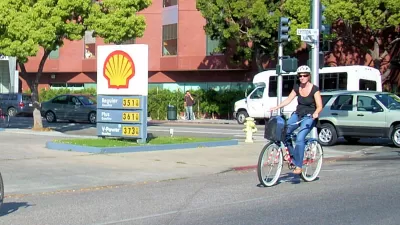SB 16 would also increase the diesel tax (which hasn't been raised in over two decades) by 12-cents, charge electric vehicles a flat $100 annual fee, and increase registration and license fees.
First, two clarifications on no increases in the gas tax since 1994.
- The state gas excise tax actually doubled in 2010 as a result of the "gas tax swap", the swap was meant to be revenue neutral, swapping a decrease in sales taxes for increase in excise taxes. Subsequently, the state Board of Equalization has both increased and decreased the excise tax as they are required to do to "adjust" revenue [see MTC explanation.]
Motorists should expect a six-cent decrease in the 36-cents excise tax on July 1 thanks to the BOE vote on Feb. 24.
- And readers may know that motorists were hit with a so-called "hidden gas tax", which, as we've explained, was in fact neither. It was a "carbon charge" resulting from motor vehicle fuel distributors participating on Jan. 01 in the cap-and-trade program authorized in the state's landmark climate legislation, AB 32, resulting in the end of the "carbon externality" for carbon-emitting motorists. [Electric vehicle motorists were already paying the fee as power generators participated in the program since its inception in 2012.]
Which brings us to the "authentic" gas tax increase, Sen. Jim Beall's (D-San Jose) SB 16. The bill fulfills one of the three infrastructure goals mentioned by Gov. Jerry Brown in his January inaugural address: "Tackling the enormous $59 billion problem of deferred highway and bridge maintenance."
In addition, the bill will help meeting the "backlog of $40 billion in [city and county road] repairs," states Sen. Beall's press release.
According to the legislation, SB 16 creates "the Road Maintenance and Rehabilitation Account in the State Transportation Fund." Revenues for the new program will come from:
- $0.10 per gallon increase in the motor vehicle fuel (gasoline) tax imposed by the bill and
- $0.10 of the $0.12 per gallon increase in the diesel fuel excise tax imposed by the bill,
- an increase of $35 in the annual vehicle registration fee,
- a new $100 annual vehicle registration fee applicable to zero-emission motor vehicles [another of the many state electric vehicle (EV) fees", though new EV buyers will continue to receive up to $5,000 through the state Clean Vehicle Rebate Project]
- This bill would incrementally increase the vehicle license fee [VLF] to a rate of 1 percent, over a 5-year period beginning July 1, 2015, with the revenues above the 0.65 percent rate to be deposited in the General Fund and used for transportation general obligation bond debt service.
On that last bullet, Gov. Arnold Schwarzenegger famously (or infamously) reduced the VLF, based on a vehicle's resale value, to .65 percent from 2 percent to fulfill a campaign promise in the 2003 recall election against Gov. Gray Davis. The VLF is calculated on the resale value of a vehicle. Notwithstanding efforts to increase it, it's been stuck at .65 percent as Streetsblog's Damien Newton explains.
The Golden State is long overdue for an increase in the gas tax. The last time the tax was increased was after Californians voted to increase it after they approved Proposition 111 in June, 1990, doubling the 9-cents excise tax over a five-year period. As Sen. Beall states, the ten cents is meant to compensate for "the decline in value lost to inflation" since 1994.
Hat tip to Melanie Curry, Streetsblog California.
FULL STORY: 10-Cent Gas Tax Increase Proposed for California for Road Maintenance

Trump Administration Could Effectively End Housing Voucher Program
Federal officials are eyeing major cuts to the Section 8 program that helps millions of low-income households pay rent.

Planetizen Federal Action Tracker
A weekly monitor of how Trump’s orders and actions are impacting planners and planning in America.

Canada vs. Kamala: Whose Liberal Housing Platform Comes Out on Top?
As Canada votes for a new Prime Minister, what can America learn from the leading liberal candidate of its neighbor to the north?

Paris Voters Approve More Car-Free Streets
Paris Mayor Anne Hidalgo says the city will develop a plan to close 500 streets to car traffic and add new bike and pedestrian infrastructure after a referendum on the proposal passed with 66 percent of the vote.

Making Mobility More Inclusive
A new study highlights the challenges people with disabilities continue to face in navigating urban spaces.

Texas Bills Could Push More People Into Homelessness
A proposal to speed up the eviction process and a bill that would accelerate enforcement of an existing camping ban could make the state’s homelessness crisis worse, advocates say.
Urban Design for Planners 1: Software Tools
This six-course series explores essential urban design concepts using open source software and equips planners with the tools they need to participate fully in the urban design process.
Planning for Universal Design
Learn the tools for implementing Universal Design in planning regulations.
Heyer Gruel & Associates PA
Ada County Highway District
Institute for Housing and Urban Development Studies (IHS)
City of Grandview
Harvard GSD Executive Education
Toledo-Lucas County Plan Commissions
Salt Lake City
NYU Wagner Graduate School of Public Service




























